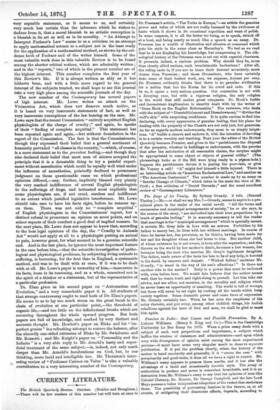CURRENT LITERATURE.
Dr. Freeman's article, " The Turks in Europe,"—an article the genuine power and value of which are not really lessened by the evidences of haste which it shows in its occasional repetition and want of polish. In some respects, it is all the better for being, so to speak, struck off at a heat, and being nearly as much like a speech as an essay. Dr. Freeman has a wealth of illustration and allusion at command which puts his style in the same class as Macaulay's. We feel as we read that he is not displaying his knowledge, but compressing it. The eth- nological history of the Ottoman race is set out with especial clearness. It presents, indeed, a curious problem. Why should they be, more than closely allied nations, such irreclaimable barbarians ? After all, the ruling caste is, if you are to trace their descent accurately, more Aryan than Turanian ; and these Circassians, who have certainly done some of their foulest work, are, we suppose, Aryans per sang. Dr. Freeman evidently thinks that there is no genuine civilisation for a nation that has the Koran for its creed and code. If this be so, it opens a very serious question. Our contention is not with a decaying race, but with a vigorous religion, the only religion in the world that still makes great conquests. Dr. Hook's feeble and inconsistent Anglicanism is smartly dealt with by the writer of "Dean Hook on the English Reformation." The reviewer, who deals with the subject of " Disestablishment and Disendowment," "divides the wolf's skin" with surprising confidence. It is quite curious to find him declaring, with every appearance of genuine feeling, that his plans for dealing with the property of the Church are not only just, but generous. As far as regards modern endowments, they seem to us simply iniqui- thus. "A." builds a church and endows it, with the intention of devoting it to a certain worship and teaching. Next year the editor of the British Quarterly becomes Premier, and gives to the "parishioners the disposal of the property, whether in buildings or endowments, with the proviso that after the satisfaction of all reasonable claims, the surplus might be appropriated to some object or objects of general utility." (The phraseology looks as if the Bill were lying ready in a pigeon-hole.) Suppose the parishioners devote it to paying the poor-rate, or give Mr. Voysey a call! "A" might feel himself a little injured. There is an interesting article on "American Ecclesiastical Law," and another on "The American Centennial." The number is made up by an essay on "Secular Change of Climate," which takes in the main the view of Mr. Croll ; a fine criticism of "Daniel Deronda ;" and the usual excellent review of "Contemporary Literature."


































 Previous page
Previous page